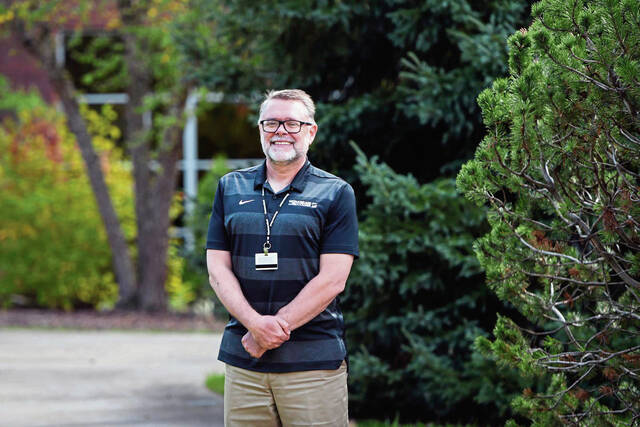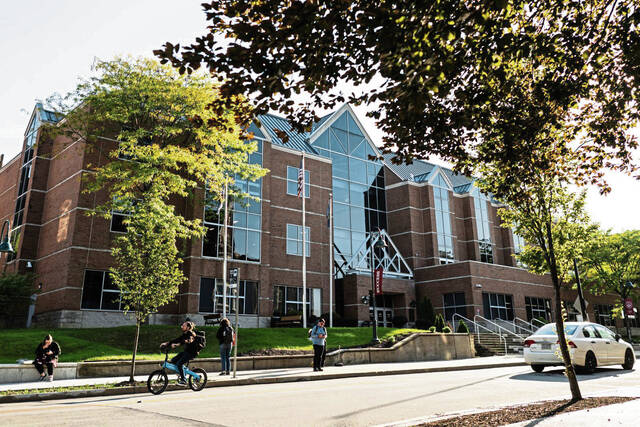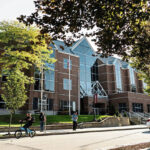Andrew Barnette wants to spend more time reading names while standing on the stage at Westmoreland County Community College’s graduation ceremony.
“I am privileged to be asked every year to read names at graduation,” said Barnette, dean of the School of Art, Humanities, Social Sciences and Public Service. “It’s the highlight of the year for all of us.”
“I want to be up there for an hour and a half reading names,” he said.
WCCC and the Community College of Allegheny County are two of four campuses in the state taking steps to help make their graduation lists a little longer.
Joining Harrisburg Area and Northampton County community colleges, the schools aim to increase graduation rates with the help of Complete College America — a national nonprofit founded in 2009.
CCAC aims to increase graduation rates by 2% each year of the program, Collins said.
WCCC’s graduation rate of 25% and CCAC’s rate of 23% fall significantly short of other area universities.
The University of Pittsburgh at Greensburg saw a 57% graduation rate among its 2017 class — which includes students who start at the Greensburg campus and receive a degree at any Pitt campus, according to spokesperson Susan Isola. Point Park saw a 52% rate for its 2018 class, according to spokesperson Barbara Vilanova.
How it works
The program, Complete College Accelerator, comes at no cost to the colleges, said Barnette.
“They’re going to give us tools and strategies that will help us sort of get insight into behaviors of students and what we can do to nudge them toward completion,” Barnette said.
This is the first year the program has been completed at a school in the state, said Dorothy Collins, vice president of enrollment services and student affairs at CCAC.
Collins submitted CCAC for the program and encouraged community colleges across the state to get on board. At least two others were required to apply for the program to come to Pennsylvania, Collins said.
“I just think it’s a great opportunity for us,” she said. “It’s an opportunity for us to expand on some areas we feel we are emerging and expanding. It’s about supporting our students.”
The nonprofit issued a survey this fall to each college’s faculty and staff to identify potential areas of improvement, Barnette said. It assessed colleges’ leadership and culture, policies, strategic finance, research, technology, advising, emergency aid and digital learning.
Representatives from the nonprofit will meet with the colleges this month to discuss the results of the survey and strategies to increase graduation rates.
The program has a three-year timeline, Barnette said. The colleges will start implementing changes in the new year.
“It could be data analysis. It could be around developmental education reform. It could be around advising,” he said. “Really, we don’t know until we have the conversation with them.”
About 80 colleges and universities across 11 states have completed the program since 2015, reporting a 10% increase in credentials and degrees awarded, according to the nonprofit.
WCCC does not have a goal graduation rate in mind, but Barnette is hopeful the college will achieve a similar increase.
“This will have knock-on effects in terms of addressing workforce needs. It’ll have knock-on effects in terms of people’s family finances when it comes to completing a college degree,” Barnette said.
Benefits of a degree
Bachelor’s degree recipients between the ages of 25 and 34 received a nearly 60% higher salary in 2022 than those with just a high school diploma, according to the National Center for Education Statistics.
“For us personally as employees of the college, that’s what we’re here for — thinking about our students and thinking about getting them through,” Barnette said.
State-owned schools and other universities across the state — including Pitt, Penn State, Geneva and Carlow — are part of the Statewide Transfer and Articulation Center, Barnette said. This allows students to transfer credits from one college to another.
Related:
• Exiting chancellor of 10 Pa. state-owned universities reports enrollment flat after 13 years of decline
• Enrollment dropped by 600 students at state-owned universities in Western Pennsylvania this fall
Earning an associate’s degree from a community college, like WCCC or CCAC, can shave off credit requirements for a bachelor’s degree at another four-year college, Barnette said.
“A lot of students will tell you when they come here they just want to get a few credits before they transfer to another college,” he said. “But we know if they complete the degree, they will save money at the other college (and) they will have a better chance of graduating from the other college.”
Nearly 38% of U.S. adults 25 and older have a bachelor’s degree, according to 2022 Pew Research Center data. This is up more than 7% from 2011.
But nearly 15% of Americans in that age category have only completed some college or do not have degrees, Pew reported. More than 62% of students who start a degree or certificate program finish their program within six years.
The Complete College Accelerator program aims to speed up the process of completing a degree, Barnette said.
The program is a “service we owe to the students,” Collins said.
“I think it matters because of who we serve — those students,” she said. “Ideally, we want you to earn a credential and we want you to transfer to a four-year institution.”















